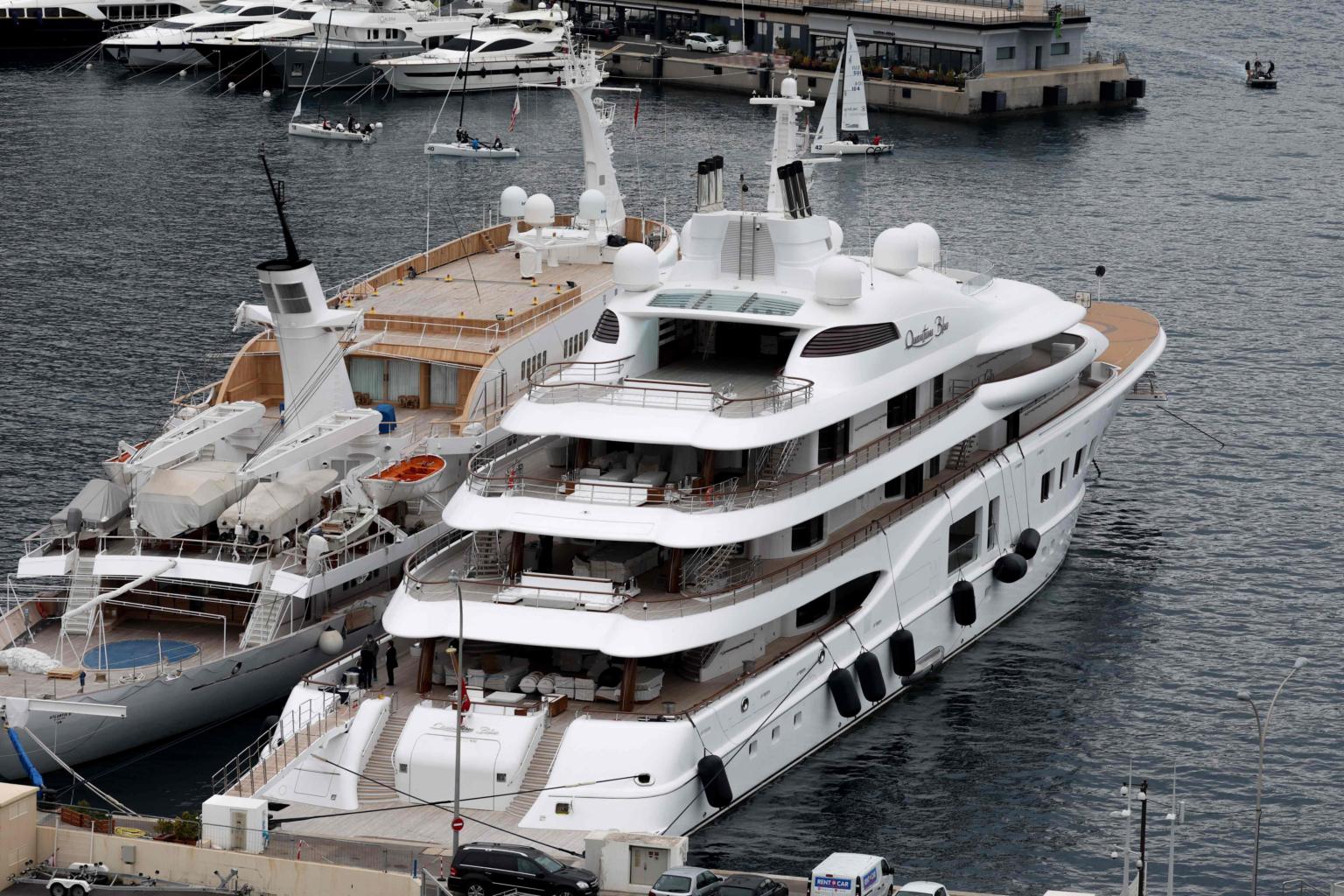Private jets, superyachts, luxury homes: Seizing assets of Russian oligarchs trickier than sanctions
Sign up now: Get ST's newsletters delivered to your inbox

Two brushes with superyachts in the EU this week illustrate how sanctions don't go as far as seizures.
PHOTO: AFP
Follow topic:
NEW YORK (BLOOMBERG) - Politicians around the world have made a show of talking tough about taking away the comforts of Russia's wealthy elite after the country's invasion of Ukraine. But actually seizing those assets will be much more difficult.
There are layers of shell companies and vast troves of wealth hidden in tax havens. Elites might transfer assets to relatives or, in the case of superyachts and private jets, park them in out-of-reach jurisdictions. Cryptocurrencies further complicate the global hunt.
The key difference, according to lawyers, economists and former government officials interviewed by Bloomberg, is that sanctions can be passed relatively quickly, while seizure is a more drastic step that involves a potentially lengthy legal process.
Still, the level of cooperation signalled by governments is unprecedented, with parallel sanctions coming down in the European Union, Britain and the United States.
President Joe Biden's administration said on Thursday (March 3) the US would sanction eight wealthy Russians and their families, including billionaire Alisher Usmanov, after unveiling a unit called "KleptoCapture", which will complement a transatlantic task force.
Whether the moves turn out to be largely symbolic or something more will depend on several critical factors. Here are some of them.
Property rights
Taking assets is especially tricky when dealing with Russia, where tycoons amassed the foundation for their wealth decades ago and have reinvested proceeds from Soviet privatisations into legitimate businesses.
Seizures demand a civil or criminal legal process that needs court approval. A common basis is violating money laundering laws.
"You've got to be very, very clear on what those assets are. Are they proceeds of a crime? If so, what is the crime?" said Dr Justine Walker, global head of sanctions, compliance and risk at the Association of Certified Anti-Money Laundering Specialists, a trade organisation for specialists in detecting financial crimes.
Concerns over due process can be addressed by limiting asset seizures to people connected to Russian President Vladimir Putin and maintaining a "high threshold" for targets, said economics professor Gabriel Zucman of the University of California at Berkeley, who researches wealth, inequality and tax havens.
Blocking boats
Two brushes with superyachts in the EU this week illustrate how sanctions do not go as far as seizures.
In France, customs officials blocked Rosneft chief executive officer Igor Sechin's superyacht from an urgent departure from the Mediterranean port of La Ciotat, near Marseille, according to the French Finance Ministry.
Mr Sechin was sanctioned by the bloc on Monday. However, the asset has not been seized by the state.
In Germany, Mr Usmanov's superyacht is docked in Hamburg and will need an export waiver to depart. A local ministry said that "no yacht leaves port that is not allowed to do so".
Meanwhile, many Russian-owned luxury yachts are out of reach of countries that have imposed penalties. Among those vessels cruising around the Maldives right now is the 142m-long Nord, owned by Mr Alexey Mordashov, a steel billionaire who was sanctioned by the EU on Monday.
Shell game
Superyachts and private jets are one thing. Other forms of wealth - bank accounts, trust funds or apartments cocooned inside a series of offshore companies - are less conspicuous.
"Regulators that need to track down assets and transactions en masse may be overwhelmed by their volume," said Rutgers Law School professor Yuliya Guseva.
One formidable obstacle: shell corporations.
"It's quick and easy to set up companies and to combine hundreds of such companies into complex networks across the globe, often in highly secretive offshore jurisdictions," said Ms Rebecca Lee, chief impact officer at OpenCorporates, which maintains a global database of corporations. It is "often impossible" to find out who has ultimate control, she said.
Cryptocurrency challenges
Cryptocurrencies further complicate the effort to enforce sanctions. They bypass traditional financial institutions, giving criminals and those suspected of wrongdoing a new way to conceal the illicit origins of funds.
Law enforcement agencies have recently scored wins in tracking down crypto wealth. Still, it took the US more than five years to seize the US$3.6 billion in Bitcoin stolen during a hack of the Bitfinex currency exchange.
Speeding up
To exert pressure on Mr Putin, governments will have to act fast. To some experts, the cooperation through a transatlantic task force is reason to think potential seizures will be swifter this time around.
So-called asset reshuffling by targeted Russian tycoons can be a potential issue. That could be addressed by pushing offshore centres to join the effort.
"If avenues are closed off in Britain and the US, even Switzerland, Singapore, where is the money going to go?" said Ms Justyna Gudzowska, director of illicit finance policy at the Sentry, an organisation that investigates global networks that benefit from conflict and kleptocracy. "It's going to go to the weakest link."

